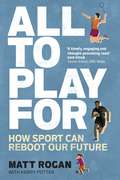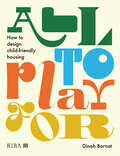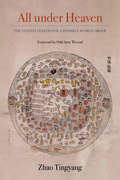- Table View
- List View
All the Young Men: How One Woman Risked It All To Care for the Dying
by Ruth Coker Burks"If I have one message with this book it's that we all have to care for one another. Today, not just in 1986. Life is about caring for each other, and I learned more about life from the dying than I ever learned from the living. It's in an elephant ride, it's in those wildflowers dancing on their way to the shared grave of two men in love, and it's in caring for that young man who just needed information without judgement." <p><p>In 1986, 26-year-old Ruth Coker Burks visits a friend in hospital when she notices that the door to one of the patient's rooms is painted red. The nurses are reluctant to enter, drawing straws to decide who will tend to the sick person inside. Out of impulse, Ruth herself enters the quarantined space and begins to care for the young man who cries for his mother in the last moments of his life. And in doing so, Ruth's own life changes forever. <p><p>As word spreads in the community that she is the only person willing to help the young men afflicted by the growing AIDS crisis, Ruth goes from being an ordinary young mother to an accidental activist. Forging deep friendships with the men she helps, Ruth works to find them housing and jobs, and then funeral homes willing to take their bodies—often in the middle of the night. She prepares and delivers meals to 'her guys,' supplementing her own income with discarded food found in the dumpsters behind supermarkets. She defies local pastors and the medical community to store rare medications for her most urgent patients, and teaches sex education to drag queens after hours at secret bars. <p><p>Emboldened by the weight of their collective pain, she fervently advocates for their safety and visibility, ultimately advising Governor Bill Clinton on the national HIV-AIDS crisis, and in doing so becomes a beacon of hope to an otherwise spurned group of ailing gay men on the fringes of society. Ruth kept her story a secret for years, fearful of repercussions within her deeply conservative community. But at a time when it's more important than ever to stand up for those who can't, Ruth has found the courage to have her voice—and the voices of those who were stigmatised, rejected and abandoned—heard.
All the colors of me - my first book about disassociation
by Ana Gómez and Sandra PaulsenAll the Colors of Me is one of the first books worldwide that embraces the goal of helping children and adolescents understand their dissociative experiences. All the Colors of Me provides mental health professionals with a great tool to educate and explain dissociation to children and adolescents. All the Colors of Me takes complex concepts from the latest theories that address dissociation and puts them into clear and concrete terms that are easy to understand for people of all ages.
All those days that I spent without you
by Laura Pérez CaballeroThis is the story of the relationship between two sisters who have never had anything in common and who have not seen each other for many years. A chance encounter brings them back together and through different characters we see that the coincidences are not left in that encounter, taking the story to a point of no return in which the ending becomes an unexpected drama. A novel that mixes feelings with a police plot written in a simple way that pushes to read one chapter after another in search of the end of the story.
All to Play For: How sport can reboot our future
by Matt Rogan Kerry Potter'A timely, engaging and thought-provoking read from an ideal guide to explore what the future may hold.' Dan Roan, Sports Editor, BBC News'Matt shows with great insight and wisdom how (sport) can form the foundations for future discovery, development and ultimately, happiness.'Ben Ryan, Olympic Gold Medal-Winning Rugby Coach and Author Sevens Heaven, Daily Telegraph Sports Book of the Year 2019Sport can save us.After a fractious decade following the 2012 Olympics, sport - one of our few remaining collective rituals - is entering its golden age. An increasingly powerful force for good, it is undergoing a dramatic transformation that will positively impact our lives, on and off the pitch.From the collective shared experience of a nationwide event and the individual benefits gained from lacing up your trainers and getting out there to the political power of a footballer's Twitter account, All to Play For is a roadmap for the way that sports can unite us in the worst of times. Illuminated by interviews with a diverse range of sports insiders, including fitness guru Joe Wicks, gold medalist Greg Searle, the mind behind the viral 'This Girl Can' campaign, Tanya Joseph, and running obsessed rockstar Johnny Marr, All to Play For dives into the past, present and future of the industry to show how sport will lead us out of the darkness and guide us in a post-pandemic world.Covering the rise of the athlete activist, the necessity of grassroots organisations, the secret recipe for making sport an effective tool for change and ten bold predictions on how it will guide us in the future, this is an examined look at why sport has the power to heal a divided world.
All to Play For: How to design child-friendly housing
by Dinah BornatHow can we meet the needs of children and young people?Just over 20% of the UK population is under the age of 18, yet they remain largely ignored when it comes to designing the places where they live.In this book, leading architect Dinah Bornat shows how we can shape communities for and with children and young people, as well as the benefits this can achieve.It combines compelling evidence, guidance and illustrated case studies to provide practical solutions for replacing, refurbishing, and reinvigorating an ageing housing stock through child-friendly design.It has become increasingly important for everyone involved in built environment projects to demonstrate a commitment to social value. This book provides opportunities to realise social value in a number of ways, including better engagement.
All under Heaven: The Tianxia System for a Possible World Order (Great Transformations #3)
by Tingyang ZhaoIn this succinct yet ample work, Zhao Tingyang, one of China’s most distinguished intellectuals, provides a profoundly original philosophical interpretation of China’s story and also develops a Chinese worldview for the future. Over the past few decades, the question Where did China come from? has absorbed the thoughts of many of China's best historians. Zhao, keenly aware of the persistent and pernicious asymmetry in the prevailing way scholars have gone about theorizing China according to Western concepts and categories, has tasked both Chinese and Western scholars to "rethink China." Zhao introduces what he terms a distinctively Chinese centripetal "whirlpool" model of world order to interpret the historical progression of China’s tianxia (All under Heaven) identity construction. In this book, Zhao forwards a compelling thesis not only on how we should understand China, but also on how China until recently has understood itself.
All's Fair
by Nancy Krulik John WendyThe fair has arrived in town! Countless games and rides, a Ferris wheel, a beauty pageant, and a whole lot of fun are in store for Katie and her friends. But guess what else has arrived? The magic wind! Talk about unfair!
All's Fair (Labor Movement In Fiction And Non-fiction Ser.)
by Richard Wormser“All’s Fair…”, first published in 1937, is a fast-paced novel set in a hard-bitten mining town ruled by those with money and their corrupt politicians. A young labor leader, Mac, comes to the town determined to solve the murder of a fellow organizer and to end the stranglehold of the current bosses. A romance develops between Mac and Sue, the daughter of a mineowner. The situation becomes desperate when the miners’ strike and Sue disappears, and Mac vows to find her. Richard Wormser (1908-1977) was a prolific American author of pulp fiction, detective fiction, westerns, and screenplays.Disguised as a mine owner’s son, young Mac is invited into the home of the Alastairs, Ware County’s ruling family, and nearly forgets his mission when Sue Alastair’s blue eyes speak in an age-old language. But the miners’ strike, Sue disappears, and Mac fights daringly. From the opening of the book to its surprising climax Richard Wormser carries his readers at a breathless pace.
All's Fair Complete Collection: Fair Game Fair Play Fair Chance (All's Fair #1)
by Josh LanyonAll three full-length novels in Josh Lanyon’s All’s Fair series, available now in this complete collection.Fair GameElliot Mills was forced to trade in his FBI badge for dusty chalkboards and bored college students. Now a professor at Puget Sound university, the former agent has put his old life behind him—but it seems his old life isn’t finished with him. A young man has gone missing from campus and as a favor to a family friend, Elliot agrees to do a little sniffing around. His investigations bring him face-to-face with his former lover, Tucker Lance, the special agent handling the case.Things ended badly with Tucker, and neither man is ready to back down on the fight that drove them apart. But they have to figure out a way to move beyond their past and work together as more men go missing and Elliot becomes the target in a killer’s obsessive game...Fair PlayFifty years ago, Roland Mills belonged to a violent activist group. Now, someone is willing to kill to prevent him from publishing his memoirs.When ex-FBI agent Elliot Mills is called out to examine the charred ruins of his childhood home, he quickly identifies the fire for what it is—arson. An injury may have forced Elliot out of the Bureau, but it’s not going to stop him from bringing the man who wants his father dead to justice.Agent Tucker Lance is still working to find the serial killer who’s obsessed with Elliot and can’t bear the thought of his lover putting himself in additional danger. Straightlaced Tucker has never agreed with radical Roland on much—”opposing political viewpoints” is an understatement—but they’re united on this: Elliot needs to leave the case alone. Now.Fair ChanceOne final game of cat and mouse… The Sculptor, the serial killer ex-FBI agent Elliot Mills spent years hunting, is finally in jail. But everyone is at risk once again—thanks to a madman determined to finish his partner’s gruesome mission. When the lead agent on the case, Special Agent Tucker Lance, goes missing, Elliot knows it’s the killer at work. After all, abducting the love of his life is the quickest way to hurt him. The chances of finding Tucker are all but impossible without the help of the Sculptor—but the Sculptor is in no position to talk. Critically injured in a prison fight, he lies comatose and dying while the clock ticks down. Elliot has no choice but to play this killer’s twisted game and hope he can find Tucker in timeAlso includes Single Malt, book one in Layla Reyne’s Agent Irish & Whiskey series!
All's Fair and Other California Stories
by Linda FeyderIn present-day Southern California, a diverse group of characters seeks the fulfillment and connection this sunny state has always promised. They come with hopes for a better lifestyle, for a change of perspective, or for the dry, mild West Coast weather. A couple moves to Palm Desert from New York for the arid, warm climate a doctor prescribes and they manage both illness and homesickness. The woman makes an unlikely friend in a young albino boy who teaches her a harsh lesson about the margin for cruelty that resides in us all. A young Mexican woman migrates to California and marries an American man—only to be deserted. A young man is disqualified from the Naval Aeronautical program and returns to his sister’s home, where he struggles with his identity and sexuality. After years of estrangement, a teenage girl travels to California from New York to spend the summer with her father. Between each of the thirteen stories in this collection are interspersed several “snapshot” stories—poetic pauses—that blend a set of images into an artistic visual unit, much like a brief cinematic experience. Every character in this collection is distinct from the next, but all of their stories unfold under the glare of the same Southern California sun—a western desert light so clear and unfiltered that it reveals everything.
All's Fair in Love and Field Hockey
by Kit RosewaterA high school field hockey star must choose between her love of the game and her new, distractingly beautiful rival in this queer YA romance perfect for fans of She Drives Me Crazy and Cleat Cute!"A masterclass in romantic tension."—Becky Albertalli, #1 New York Times bestselling author of Simon vs. the Homo Sapiens AgendaEvelyn was raised to see field hockey as war.Before she could write her own name, her family&’s legacy on the field was already spelled out. Every step Evelyn takes toward glory is within a footprint her mother left behind. And no step matters more than this next one, with Evelyn about to lead her varsity team into their final battle season. Evelyn is beyond ready to score the Nationals title and win the critical scholarship to her mom&’s alma mater that comes with it.This year, she&’s out for blood, and nothing can stand in her way......except for Rosa Alvarez, the highly talented new recruit on her biggest rival&’s team.After a humiliating homecoming game and follow-up prank leave the two enemies in a stalemate, they grudgingly strike a deal to help each other overcome their weaknesses on the field. But the more time Evelyn spends with Rosa, the more she finds herself casting her hardened armor aside, until she begins to wonder what life might be like if she left the battlefield behind and fought for love instead."This one&’s definitely a keeper!&”—Jennifer Dugan, bestselling author of Some Girls Do
All's Fair in Love and Law: Small Town Tales of Life, Laughter and Litigation
by Alan HammondDufty Dufty Popple & Dunn is a traditional solicitors' firm in the small Midlands town of Hockam (pronounced Hokum, as the local residents are at pains to point out). This heart-warming collection of stories revolves around the lives, relationships, triumphs and failures of the good people of Hockam and of the lawyers to whom they look for help. We meet the lonely dentist and his noisy neighbours, the TV celebrity chef and his complex family, the policeman and his beloved budgies, the Vicar and the Major General, the greedy beneficiary of an uncle's will. These and many others bring their problems to Dufty Dufty Popple & Dunn to be resolved by the long-suffering and well-meaning members of the firm, all of whom have their own lives to live when time permits, from Bernard, the hapless trainee, to Hugo Dufty, the nominal senior partner. And then, of course, there are the ever-present rumours concerning Robert Popple, the former partner who departed from the firm some years previously in mysterious circumstances. The whole symphony of life portrayed here is conducted with gentle humour and charm by Hugo's father, Charles Dufty, who founded the firm fifty years ago and whose wisdom and deep understanding of the human condition helps to make sense of even the most difficult and apparently insoluble problems. In this humorous and touching debut collection, Alan Hammond paints a timeless portrait of life in a rural English town. Welcome to Hockam.
All's Fair in Love and Law: Small Town Tales of Life, Laughter and Litigation
by Alan HammondHumorous and heart-warming tales of English rural life centred on a traditional firm of country solicitors, perfect for fans of Rumpole of the Bailey and James Herriot.Dufty Dufty Popple & Dunn is a traditional solicitors firm in the small Midlands town of Hockam (pronounced Hokum, as the local residents are at pains to point out). This heart-warming collection of stories revolves around the lives, relationships, triumphs and failures of the good people of Hockam and of the lawyers to whom they look for help.We meet the lonely dentist and his noisy neighbours, the TV celebrity chef and his complex family, the policeman and his beloved budgies, the Vicar and the Major General, the greedy beneficiary of an uncle's will. These and many others bring their problems to Dufty Dufty Popple & Dunn to be resolved by the long-suffering and well-meaning members of the firm, all of whom have their own lives to live when time permits, from Bernard, the hapless trainee, to Hugo Dufty, the nominal senior partner. And then, of course, there are the ever-present rumours concerning Robert Popple, the former partner who departed from the firm some years previously in mysterious circumstances. The whole symphony of life portrayed here is conducted with gentle humour and charm by Hugo's father, Charles Dufty, who founded the firm 50 years ago and whose wisdom and deep understanding of the human condition help to make sense of even the most difficult and apparently insoluble problems.In this humorous and touching debut collection, Alan Hammond paints a timeless portrait of life in a rural English town. Welcome to Hockam.
All's Fair in Love and Law: Small Town Tales of Life, Laughter and Litigation
by Alan HammondDufty Dufty Popple & Dunn is a traditional solicitors firm in the small Midlands town of Hockam (pronounced Hokum, as the local residents are at pains to point out). This heart-warming collection of stories revolves around the lives, relationships, triumphs and failures of the good people of Hockam and of the lawyers to whom they look for help.We meet the lonely dentist and his noisy neighbours, the TV celebrity chef and his complex family, the policeman and his beloved budgies, the Vicar and the Major General, the greedy beneficiary of an uncle's will. These and many others bring their problems to Dufty Dufty Popple & Dunn to be resolved by the long-suffering and well-meaning members of the firm, all of whom have their own lives to live when time permits, from Bernard, the hapless trainee, to Hugo Dufty, the nominal senior partner. And then, of course, there are the ever-present rumours concerning Robert Popple, the former partner who departed from the firm some years previously in mysterious circumstances. The whole symphony of life portrayed here is conducted with gentle humour and charm by Hugo's father, Charles Dufty, who founded the firm 50 years ago and whose wisdom and deep understanding of the human condition help to make sense of even the most difficult and apparently insoluble problems.In this humorous and touching debut collection, Alan Hammond paints a timeless portrait of life in a rural English town. Welcome to Hockam.Read by Graham Seed(p) 2011 Orion Publishing Group
All's Fair in Love and Mastery (Masters Unleashed #5)
by Sparrow BeckettSparrow Beckett masters the enemies-to-lovers trope in this steamy romance, following Master in Shining Armor.Grant Ellis, co-owner of the exclusive Catacombs club, can't stand Arabella Dexter...his own best friend. One scorching night shouldn't have made things weird between them, but it changed everything. Who knew there were lines friends can't uncross? Now, no one gets under his skin and drives him wild quite like Dex. Since she refuses to wear his collar, he can only mask his desire with sarcasm and antagonism.Dex has had it up to here with Grant. He's a bossy, domineering jerk, and the sexiest man she's ever been with. Even so, she's done with collars and the nonsense that comes with commitments. When he extends an olive branch and invites her to visit his new resort on a remote island in Canada, it's a chance to get their friendship back on track.Alone in the wilderness for a week, they explore Grant's investment and the boundaries of their relationship. Some bonfires can't be contained.
All's Fair in Love and Pickleball
by Kate SpencerPickleball rivalry? Sure. Falling for your fake boyfriend? Now that&’s a surprise. Bex Martin&’s racquet club is her entire world. But the business she inherited from her mother has started to feel more like a sinking ship. That is, until Nikolaus Karras—a former tennis bad-boy with an ego as big as his serve—makes himself at home on her courts. Niko has something to prove, and a high-stakes pickleball tournament is just what he needs to get back in the game after a career-ending injury. When he is finally able to set his ego aside to ask for Bex&’s help, everyone assumes that they are a couple—on and off the court. But she needs the prize money to save the club, and he needs a win to restore his reputation. So now they have a fake relationship as well as a doubles partner that they can&’t seem to resist. Game on!
All's Fair in Love and Pickleball
by Kate SpencerPickleball rivalry? Sure. Falling for your fake boyfriend? Now that's a surprise.Bex Martin's racquet club is her entire world. But the business she inherited from her mother has started to feel more like a sinking ship. That is, until Nikolaus Karras - a former tennis bad-boy with an ego as big as his serve - makes himself at home on her courts.Niko has something to prove, and a high-stakes pickleball tournament is just what he needs to get back in the game after a career-ending injury. When he is finally able to set his ego aside to ask for Bex's help, everyone assumes that they are a couple - on and off the court.But she needs the prize money to save the club, and he needs a win to restore his reputation. So now they have a fake relationship as well as a doubles partner that they can't seem to resist. Game on!
All's Fair in Love and Pickleball
by Kate SpencerPickleball rivalry? Sure. Falling for your fake boyfriend? Now that's a surprise.Bex Martin's racquet club is her entire world. But the business she inherited from her mother has started to feel more like a sinking ship. That is, until Nikolaus Karras - a former tennis bad-boy with an ego as big as his serve - makes himself at home on her courts.Niko has something to prove, and a high-stakes pickleball tournament is just what he needs to get back in the game after a career-ending injury. When he is finally able to set his ego aside to ask for Bex's help, everyone assumes that they are a couple - on and off the court.But she needs the prize money to save the club, and he needs a win to restore his reputation. So now they have a fake relationship as well as a doubles partner that they can't seem to resist. Game on!
All's Fair in Love and Scandal
by Caroline LindenNothing wagered... Douglas Bennet can't resist a good wager, especially not one that involves a beautiful woman. When a friend proposes an audacious plan to expose the most notorious woman in England, Douglas agrees at once. <P><P>After all, it would be quite a coup to discover the true identity of Lady Constance, author of the infamous erotic serial scandalizing the ton, 50 Ways to Sin.Nothing won... Madeline Wilde is used to being pursued. For years she's cultivated a reputation for being unattainable and mysterious, and for good reason: her livelihood depends on discretion. When Douglas turns his legendary charm on her, she dismisses him as just another rake. But he surprises her--instead of merely trying to seduce her, he becomes her friend...her confidant...and her lover. But can it really lead to happily-ever-after...or are they about to become the biggest scandal London has ever seen?
All's Fair in Love and Treachery: A Mystery (Lady Petra Inquires #2)
by Celeste Connally*A USA Today bestseller*Bridgerton meets Agatha Christie in this dazzling next installment in a captivating Regency-era mystery series with a feminist spin.21 June, 1815. London may be cheering the news of Napoleon’s surrender at Waterloo, but Lady Petra Forsyth has little to celebrate after discovering that the death of her viscount fiancé three years earlier was no accident. Instead, it was murder, and the man responsible is her handsome, half-Scottish secret paramour Duncan Shawcross—yet the scoundrel has disappeared, leaving only a confusing riddle about long-forgotten memories in his wake.So what’s a lady to do when she can’t hunt down her traitorous lover? She concentrates on a royal assignment instead. Queen Charlotte has tasked Petra with attending an event at the Asylum for Female Orphans and making inquiries surrounding the death of the orphanage’s matron. What’s more, there may be a link between the matron’s death and a group of radicals with ties to the aristocracy, as evidenced by an intercepted letter.Then, Petra overhears a nefarious conversation with two other men about a plot to topple the monarchy, set to take place during three days of celebrations currently gripping London.As the clock counts down and London’s streets teem with revelers, Petra’s nerves are fraying as her past and present collide. Yet while all’s fair in love and war, she can never surrender, especially when more orphaned girls may be in trouble. And to save their lives, the monarchy itself, and even her own heart, Lady Petra must face her fears with the strength of an army of soldiers and fight with the heart of a queen.
All's Fair in Love and War (Miss Prentice’s Proteges)
by Virginia Heath'A refreshing array of dazzling wit, hidden depths, lip curling humour and heartmelting fun, in all its entangling intimacy!!' ⭐ ⭐ ⭐ ⭐ ⭐ reader praise for the Merriwell Sisters series!'Virginia Heath's fun characters and situations will have you laughing out loud!' SABRINA JEFFRIES'Filled with fabulously British banter, wit, and heart' EVIE DUNMORE'Heath is carving a name for herself in historical rom-coms' BOOKLIST starred reviewALL'S FAIR IN LOVE AND WAR is the first in a new Regency romp of a series from the author of the Merriwell Sisters series!________________________When former naval captain, Harry Kincaid, is left in the lurch with his flighty older sister's three unruly children, he hasn't a clue how to handle it. Desperate, and prepared to pay whatever it takes, he turns to Miss Prentice's School for Young Ladies for an emergency governess who can get his formerly ordered house running shipshape again.After a strict and miserable upbringing, fledgling governess Georgie Rowe doesn't believe that children should be seen and not heard. She believes that childhood should be filled with laughter, adventure, and discovery (. . . everything hers wasn't). Thankfully, the three Pendleton children are already delightfully bohemian and instantly embrace her unconventional approach. However, their staid, stickler-for-the-rules uncle, is another matter entirely.Georgie and Harry are soon butting heads over their differences, but as time passes, their attraction soon becomes undeniable and, after all, all's fair in love and war . . .________________________Readers LOVED the Merriwell Sisters!!'An utterly heartwarming and hilarious romp through regency England . . . Virginia Heath's new series is the perfect blend of humour and romance that Bridgerton fans will fall head over heels for' 5⭐ NetGalley review'A fresh, fun and a totally original take on the regency romance genre . . . the witty banter is brilliant and so entertaining! . . . I can't wait to read more from this author' 5⭐ NetGalley review'I absolutely loved this book . . . A historical romance with humour. Looking forward to the next book by Virginia Heath' 5⭐ NetGalley review'What a fun story! . . . Hugh and Minerva have fantastic chemistry, and they send up sparks every time they are on the page together . . . A great read all the way around!' 5⭐ NetGalley review'The first in a new series & boy what a starter, it had me hooked & giggling from the first page . . . If you want a humorous, entertaining often farcical yet romantic read look no further' 5⭐ NetGalley review'I loved, loved, loved this story!' 5⭐ NetGalley review
All's Fair in Love and War: A Novel (Miss Prentice's Protegees #1)
by Virginia HeathIn the first installment of a Regency romp of a series, a governess who believes in cultivating joy in her charges clashes with the children’s uncle who hired her, only to find herself falling in love.When Harry Kincaid’s flighty older sister decides to join her husband on an Egyptian expedition, Harry, a former naval captain, is left in the lurch, minding her three unruly children and giant, mad dog. But Harry has a busy career at the Admiralty that requires all his attention, and he has no clue how to manage the little rascals or when his sister is coming back. In desperation, he goes to Miss Prentice’s School for Young Ladies prepared to pay whatever it takes to hire an emergency governess quick sharp to ensure everything in his formerly ordered house is run shipshape again.Thanks to her miserable, strict upbringing, fledgling governess Georgie Rowe does not subscribe to the ethos that children should be seen and not heard. She believes childhood should be everything hers wasn’t—filled with laughter, adventure, and discovery. Thankfully, the three Pendleton children she has been tasked with looking after are already delightfully bohemian and instantly embrace her unconventional educational approach. Their staid, stickler-for-the-rules uncle, however, is another matter entirely. Georgie and Harry continue to butt heads over their differences, but with time it seems that in this case, their attraction is undeniable—and all is indeed fair in love and war.
All's Fair in Love and Wardrobe: A Fashion Editor?s Rules on Shopping for Love
by Malia Carter Stephanie SimonsDoes your love life need a makeover?At last, a dating rulebook for fashion lovers! All's Fair in Love and Wardrobe puts a uniquely glamorous spin on shopping for love, offering pearls of wisdom from a venerable fashion editor. Who better to help you resist wayward temptation and avoid potentially expensive mistakes?With stiletto-sharp wit, this little guide reinvents the dos and don'ts of dating, covering everything from The Bra Code to the etiquette of chatting up a living mannequin. By the time your nail polish is dry, you'll also learn to: Give your love life a makeover Write a lipstick letter like you mean it Prevent first date faux pas Pack for a proper getaway (as in, get away from a creeper...fast!) Communicate effectively with the right statement pieces And more!Consider this statement-making little book your front-row seat to the madcap antics of the modern guy-featuring more than one hundred rules on shopping for love, eye candy fashion illustrations, and a standard Curate-a-Date application for weeding out ill-fitting duds and heartbreaking heels.
All's Fair in Love and Wine (Love in the Valley #2)
by Michele DunawayUnlike a fine wine… some memories don&’t age well. Unexpectedly back in town, Jack Clayton acted as if he&’d never crushed Sierra James&’s teenage heart. When he offered to buy her family's vineyard, the former navy lieutenant knew Jack was turning on the charm, hoping to win her over. No way would Sierra melt for him again; she was ready for battle. But would denying what she still felt for Jack prove to be a victory she could savor?From Harlequin Special Edition: Believe in love. Overcome obstacles. Find happiness.Love in the Valley Book 1: What Happens in the AirBook 2: All's Fair in Love and WineBook 3: Love's Secret Ingredient
All's Fair in Love and Wolf (Silver Town Wolf #8)
by Terry SpearThe Silver Town wolf pack has your back Wolf shifter Sarandon Silver's in trouble with the law, and bounty hunter she-wolf Jenna St. James is determined to bring him in for trial. Lucky for Sarandon, the entire Silver Town pack is ready to fight for his innocence. But until the case is solved, Jenna's sticking to Sarandon like glue...Silver Town Wolf: Destiny of the Wolf (Book 1) Wolf Fever (Book 2) Dreaming of the Wolf (Book 3) Silence of the Wolf (Book 4) A Silver Wolf Christmas (Book 5) Alpha Wolf Need Not Apply (Book 6) Between a Wolf and a Hard Place (Book 7)All's Fair in Love and Wolf (Book 8) What People Are Saying: "Sweet and sexy."—Fresh Fiction for Between a Wolf and a Hard Place "Spear has become a master storyteller."—RT Book Reviews, 4 Stars for Alpha Wolf Need Not Apply"Magnificently entertaining."—RT Book Reviews, 4.5 Stars TOP PICK! for Billionaire in Wolf's Clothing























